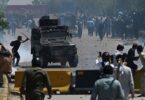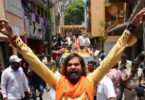Iqbal Khan
India, as a state, presents a stimulating case of proliferating extremism. Over the centuries ‘Greater India’ has been shrinking in size as more and more ethno-sectarian minorities chose to create separate political entities in order to escape the strait jackets imposed by Hindu extremism. Post-independence era touted as India’s democratic order could not grow beyond tyranny of majoritarian rule. A number of struggles varying from internal autonomy to outright independence are a “political normal” for contemporary India. Recent cases of extremism in India are not really a new phenomenon; instead country’s history is full of cases where minorities had to face violence and bear the brunt of exclusionism in one way or the other.
Institutional behaviour is also worrisome as there is an extremist mindset in the judiciary, security forces and parliament. For example, in case of Babri Mosque, Indian superior judiciary remained under pressure of mobs; and law enforcement agencies also did not take action while the mosque was being burnt and demolished, snaps captured security personnel responsible for protecting the mosque structures gleefully participating in demolition. And years later Indian Supreme Court distributed the mosque site amongst communities, meeting the Hindu demand first; it shamefully recorded the reason for this injustice as going by “public aspirations”. Same reason was recorded while sentencing Afzal Guru to death.
Prime Minister Narendra Modi’s tenure has set the exclusionism in full display.
The hatred against Muslims has specially escalated in the prevalent Hindutva mindset and the situation is expected to get even worse due to forthcoming Indian elections, because hatred against minorities and exclusionist rhetoric sells well amongst the masses-especially in rural India.
Indian is promoting partisanship in the name of nationalism and keeps on fuelling exclusionism by oppressing its minorities. Politicians and extremists depended on each other in India, for their reciprocal sustenance. Politics has been criminalised and crime has been politicised to the extent that rights of minorities are no longer even a periphery concern. While there may be numerous causative factors and contributing conditions for in vogue exclusionism practiced in India, main factor for its sustenance in the well baptised caste system in Hindu mythology, where lowest cast persons are considered unworthy of touching- “Shudras”. Hence, every Hindu is expected to take his assigned place by birth, as god given, and there is no inter-cast vertical movement. Hence there is an inbuilt instinct to extend this intra Hinduism doctrine of exclusiveness to other religions as well-assigning them derogatory title of “Maleesh” – unclean.
Another important factor is that the Hindus have not been able to accept the reality that they were ruled by Muslims for over 900 years. As a consequence of this inherent complex, they are now attempting to distort or skip the important parts of history which they are not able to digest. Various places have been renamed to suit the Hindutva narrative. The creation of Pakistan is yet another contributing factor; even the prominent Muslims personalities in India are often asked by the extremists to “go back” to Pakistan despite their neutral background.
That is why despite continuous loss to chunks of territories on this count, there is no flexibility in the stone-etched mindset. Interfaith marriages are considered as “Love Jihad”, and cow vigilante is an evolving phenomenon despite the fact that India is World’s largest exporter of beef; Pakistani artists are banned to perform in India etc.
By composition India consists of a pluralist mass of people, however, by practice, or say, by default it is perpetually self-gravitating toward exclusive socio-economic formulations leading to absence of level playing field for minorities, culminating into denial of due political space for non-Hindus, with the exception of showcasing occasional occupation of high profile posts by non-Hindus. The ground realities throw up a whole range of paradoxes. Representation of minorities at executive level jobs and at parliament is much below par with demographic realities. An accomplished academician Dr Junaid Ahmad has exposed the real face of India in his recently launched book “India an Apartheid State”. “India has emerged as an apartheid state totally dominated by the Hindu fundamentalists. India claims itself to be a secular country but practically it is a Hindu state with a caste system which promotes inequality and apartheid. There have been thousands of riots in India since 1947. Hindus have been committing atrocities against Dalits, Muslims, Christians and Sikhs in the bloody riots spread over decades. Ongoing insurgencies in numerous states of India are likely to eventually implode the country from within”.
Hindutva, as a political movement is an effort to reshape India. India is stratified, and element of apartheid is a cultural fault line, even though its constitution protects rights of minorities. India’s claims of a secular state do not match with actually practiced norms vis-à-vis the minorities. B R Ambedkar, author of India’s constitution said, “If Hindu Raj does become a fact, it will, no doubt be the greatest calamity for this country.
While Narendra Modi was contesting to become the chief minister of Gujarat, he used posters on which his (Modi) and General Pervez Musharraf’s pictures were printed mentioning that a vote against Modi would be in favour of Musharraf.
During last general elections, Modi again used the same language saying the vote against him would be a vote in favour of Pakistan and terrorism. Under the façade of secularism, Hindutva has taken firm roots and is a bipartisan phenomenon. Even though out of the two alternatively ruling alliances, one may own it with heightened symbolism, the other one also essentially embraces its spirit and core practices, while maintaining a denial mode.






